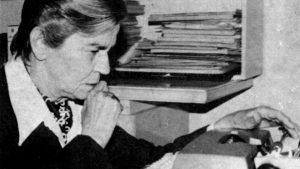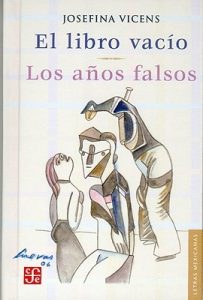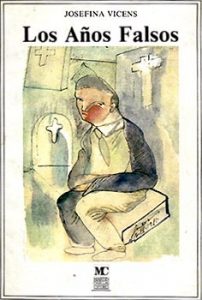The Empty Book – Josefina Vicens – 1992
Posted by Steven on 22/9/2012, 19:30:56

At this time last year Guillermo proposed a list of works by female Mexican authors. We eventually narrowed it to one: Recollections of Things to Come by Elena Garro, which we will read in December. However, all of the books on the list sounded enticing, so I found copies of each and have begun to read them. I just finished The Empty Book by Josefina Vicens, and was floored by how good a novel it is to be so little-known outside Mexico.
Here is my review:
José García has two notebooks. The first is for his random daily thoughts, his notes, his experiences, his ideas. The second is for the draft of the novel he tells everyone he is writing. The second notebook is empty.
García is a lower middle class accountant living somewhere in Mexico and barely supporting his wife and two sons. For reasons he can’t explain or understand, he is compelled to write even though, as he freely admits, he doesn’t know how, and he has nothing to say. The first notebook opens with a string of such self-recriminations. The more he writes, the deeper his guilt over having produced nothing of value. Often he has considered burning his notebooks, only to realize that the next thing he would do is buy a new notebook to record his feelings about having burned the previous one.
But without having planned it, García begins to fill the first notebook with thoughts and reminiscences about his wife, his sons, an extramarital affair, his financial difficulties, and his job. Thinking about his wife, he observes that “it is only in the body of a person whom we have loved deeply for a long time that we don’t perceive the passing of time, and that growing old with that person is a way of never growing old. Seeing someone from day to day has a slow, compassionate rhythm.”
When his grown son falls in love with an older woman, García despairs of giving him guidance:
Maybe he’s right. He feels I can’t understand it. He considers my fifty-six years capable of conserving the memory of a twenty-year-old’s love but not its richness. He feels that I keep the whole experience inside me, compact, sort of petrified, but that I can no longer separate and give the emotions their exact value that love aroused, that I no longer understand tears, hope, desire, or the absolute truth that the world begins in the head of a woman and ends at her feet. There are no other surroundings, there is no other horizon. She, she alone with her small boundaries that contain everything….
Don’t pay any attention to my advice; experience lies at the end of the road, and I shouldn’t deprive you of either the pleasure of the road or the sad wealth you’ll find when you come to its end. Because that’s what experience is: a sad wealth that shows you only how you should have lived but not how to live again.
And most poignantly, García speaks of the common man’s sense of hope and the future. We are always wanting time to hurry by so that we can see our dreams materialize. We look forward to watching our children grow, to gaining the next promotion, to paying off our debts, and to putting a bad experience behind us. “And so,” he concludes, “hoping that time will pass so that the daily problems that weigh us down will also pass, we find one day that our own time has passed.”
José García’s empty notebook stands for the unrealized dreams of all of us who will never be heroes or celebrities. The Empty Book is a beautiful and moving expression of both the shattered hopes and the hidden richness of a common life, and of the nature of memory and experience. It was also, in 1958, the first work of metafiction by a Mexican author. José García writes about writing. When a close friend is put on trial for embezzling money to pay medical bills, García confesses, “So there were moments when I experienced both sorrow because of the event and enthusiasm for the possibility of describing it, and felt both with equal passion.”
It is amazing that a novel this good, this readable, and of such importance in the Latin American literary tradition should now be so obscure. But Josefina Vicens was a modest woman, always writing under masculine pen names, who refused to promote her own work. Her gender and political views probably played a role as well in keeping The Empty Book from a wider readership. If you can find a copy, I highly recommend it.
~

